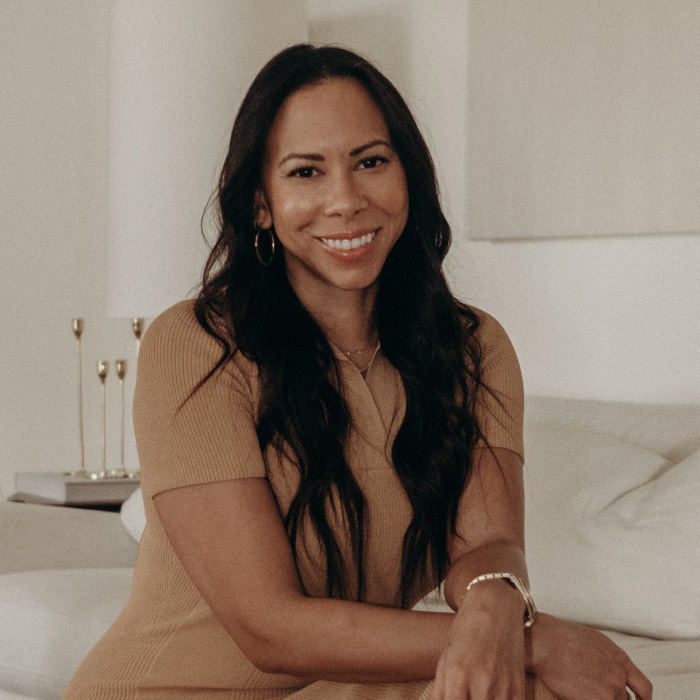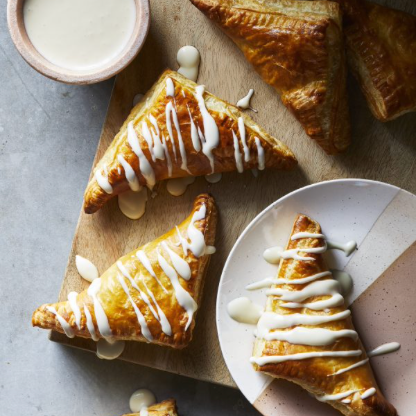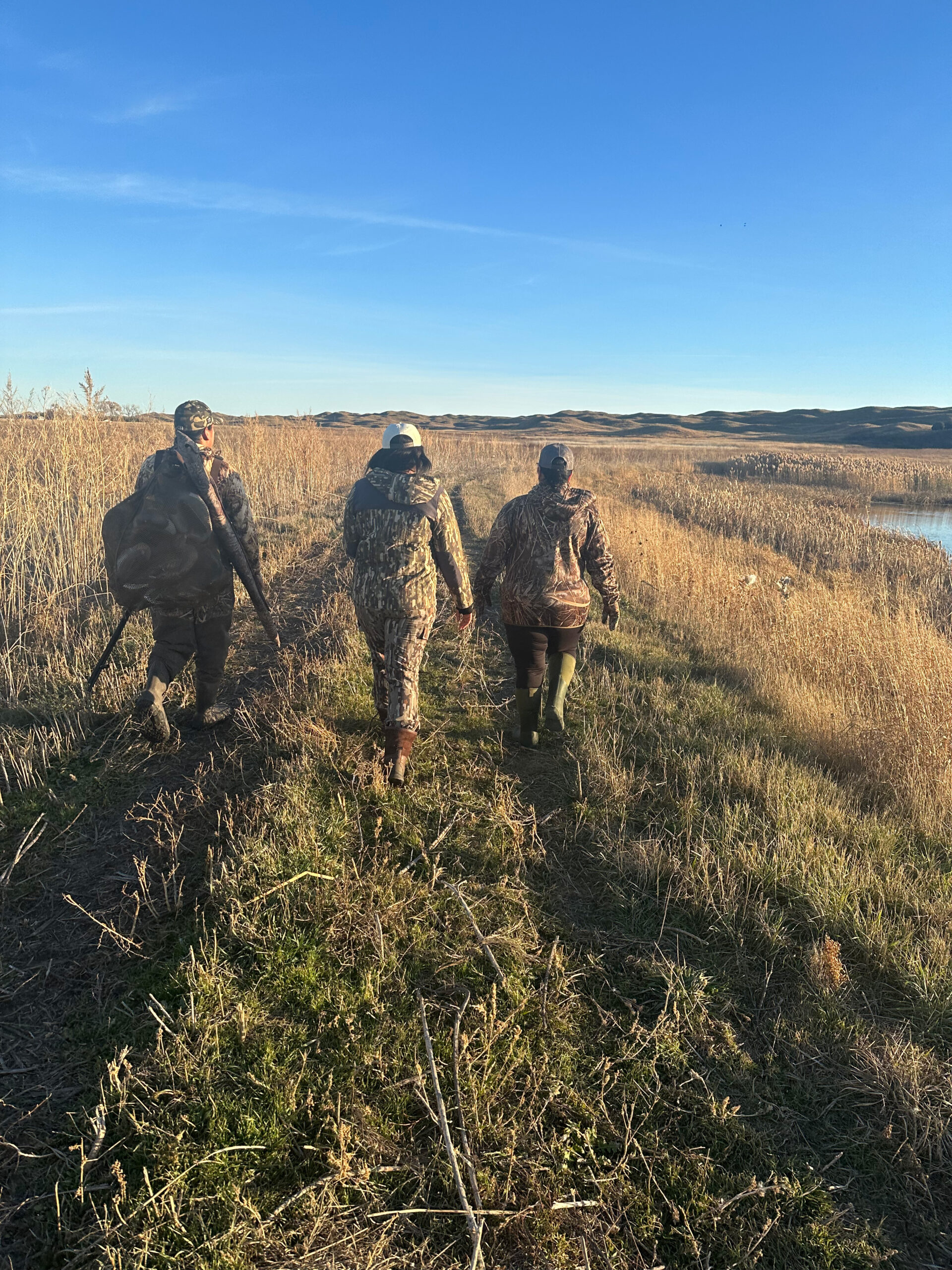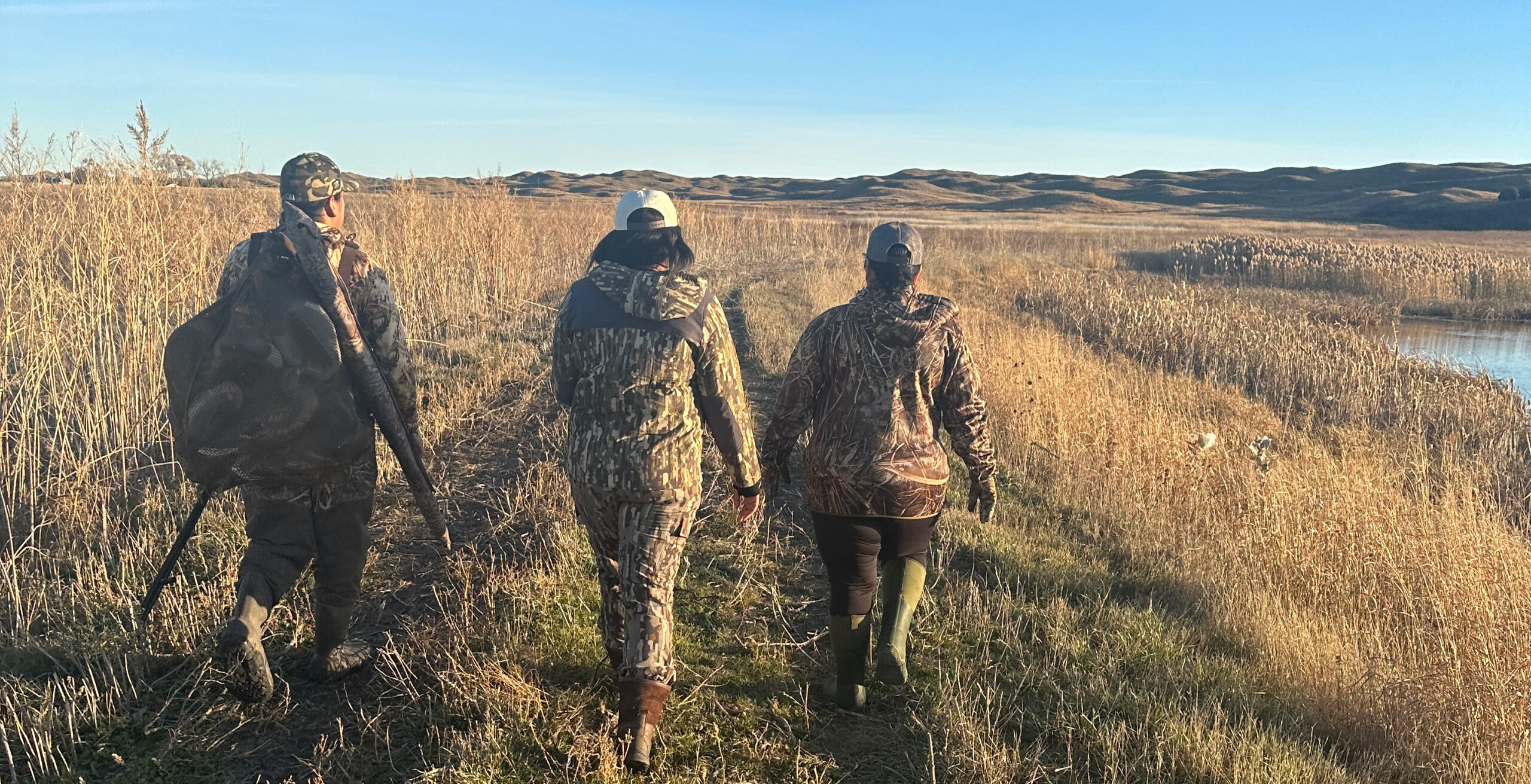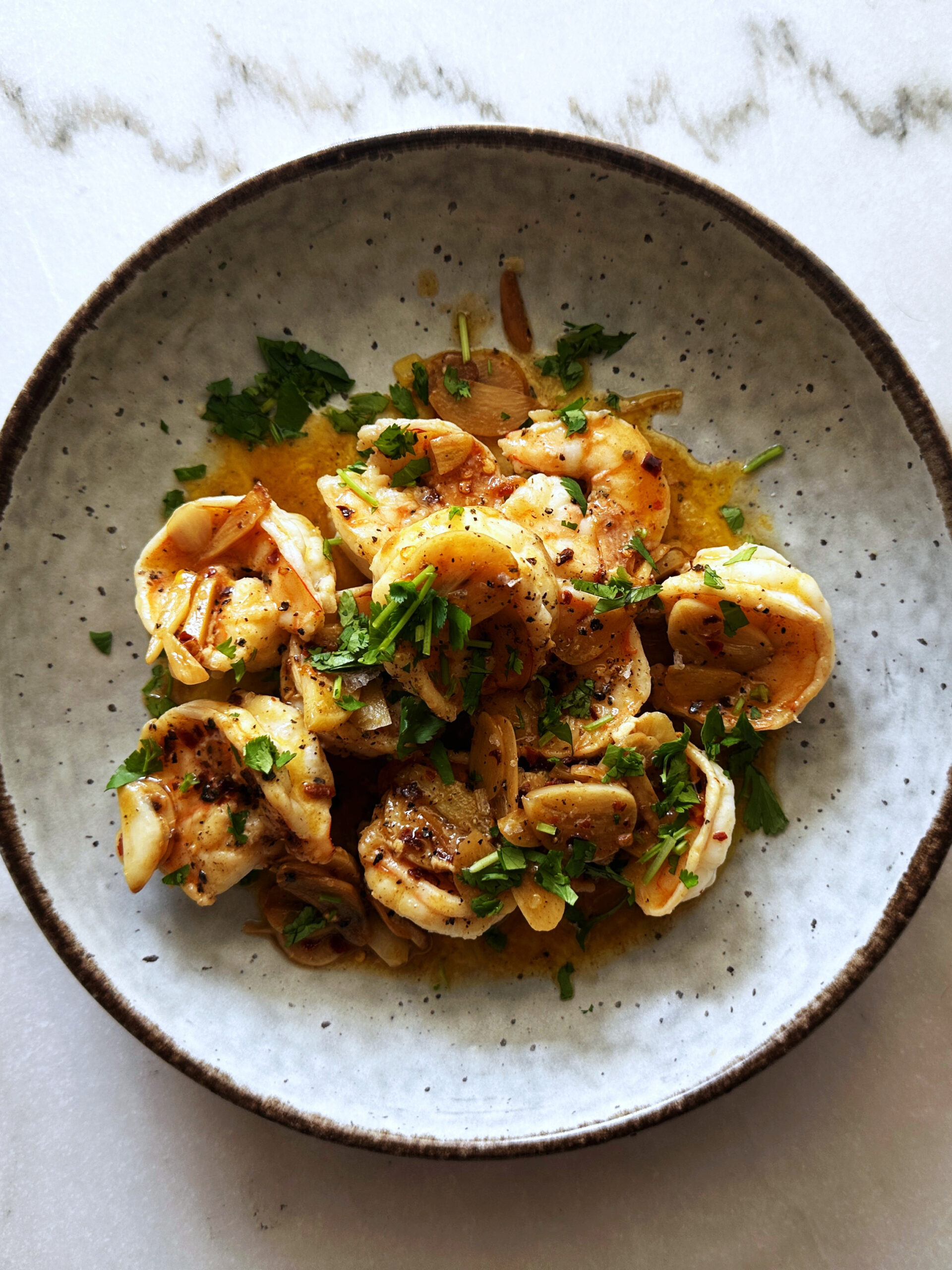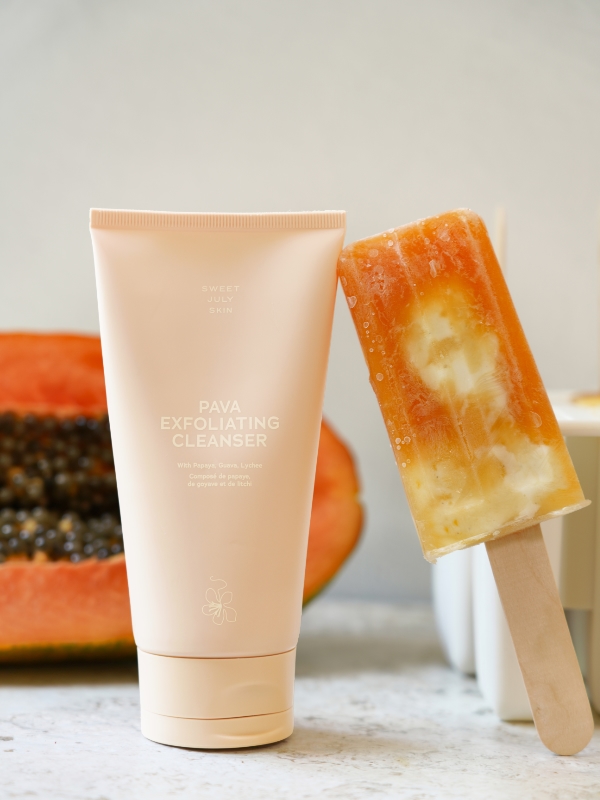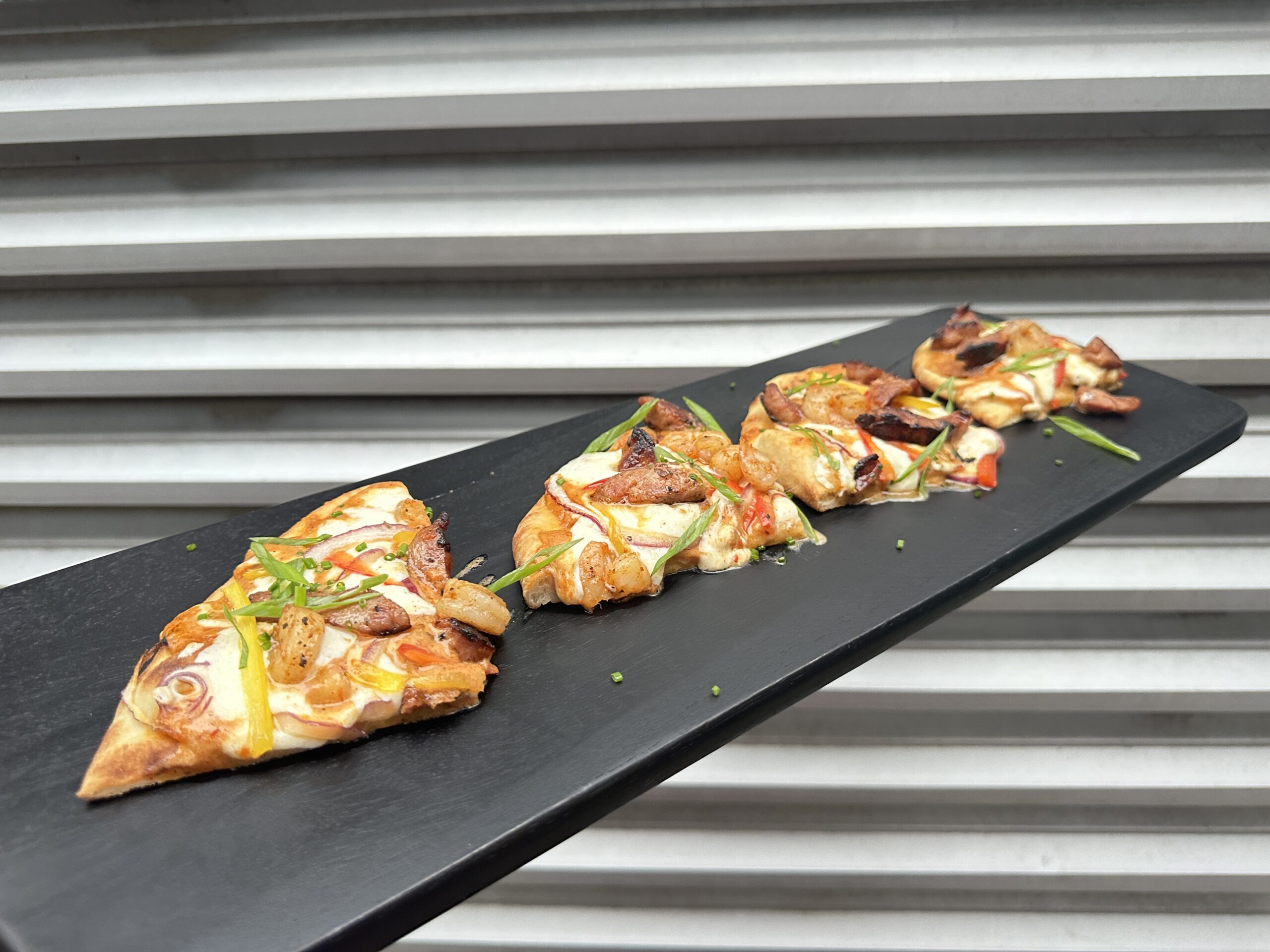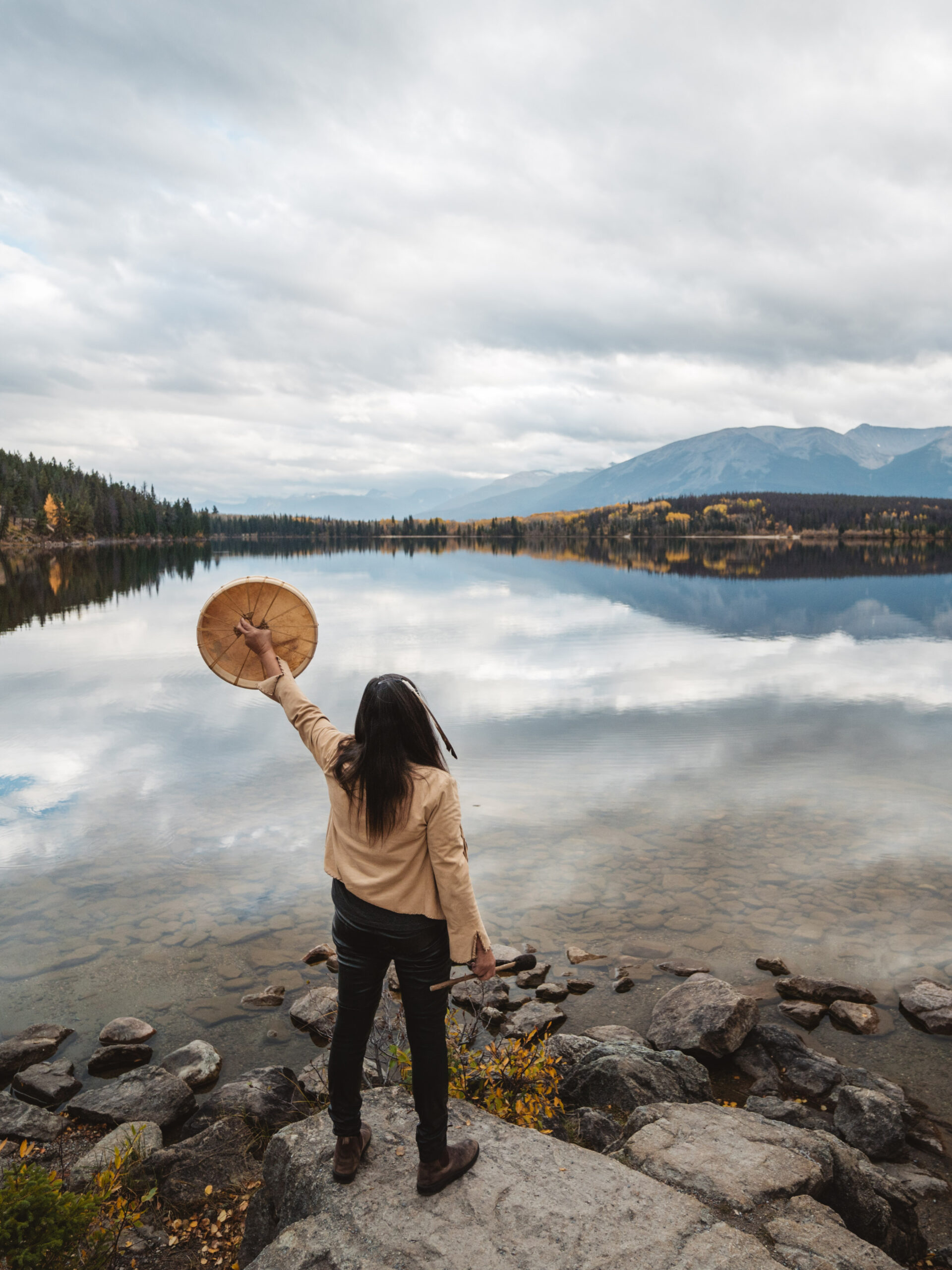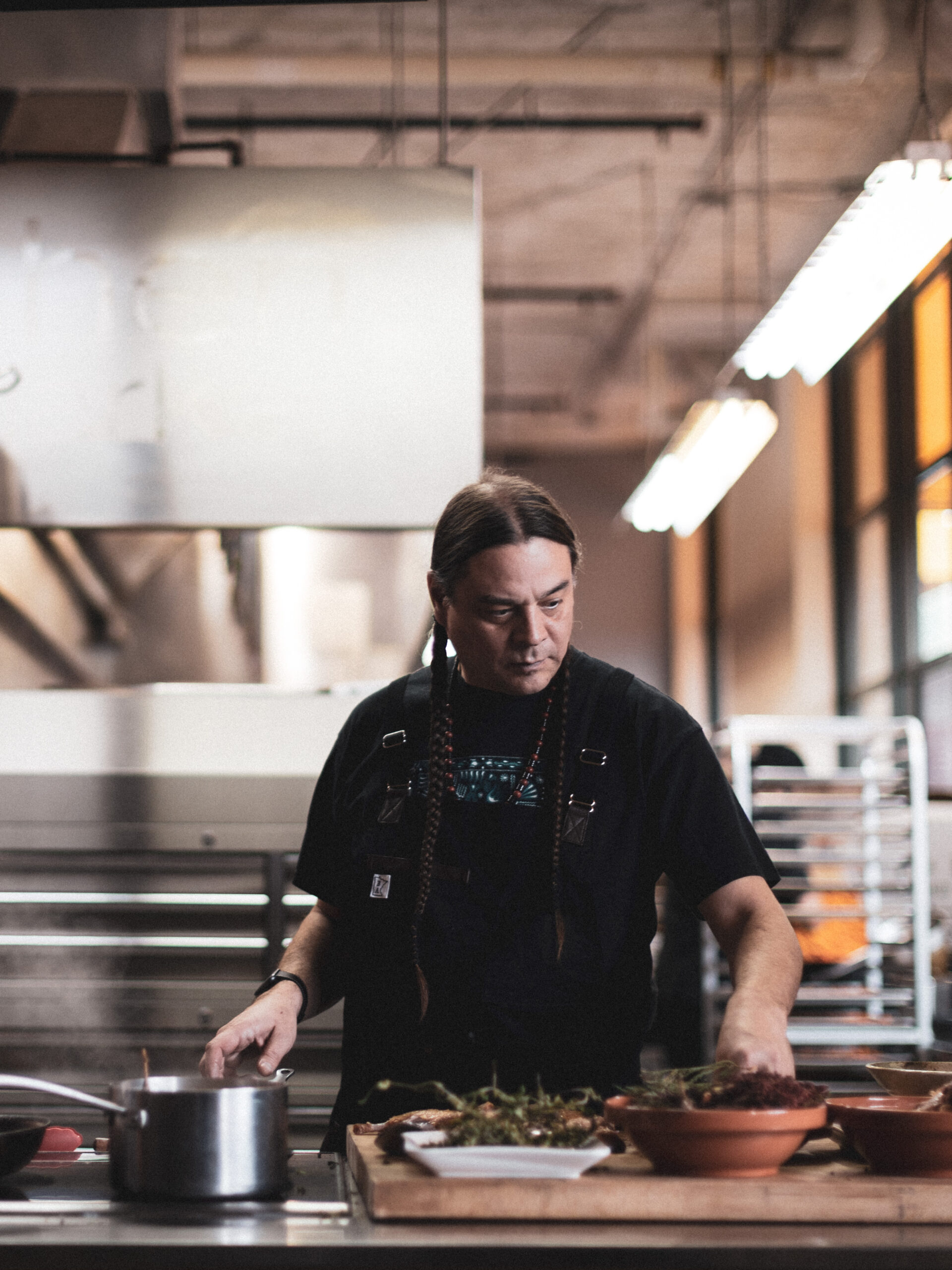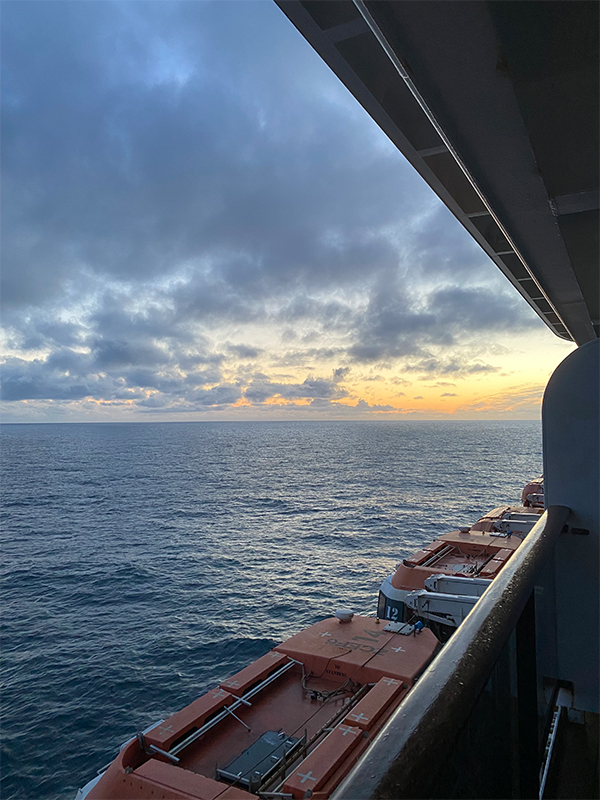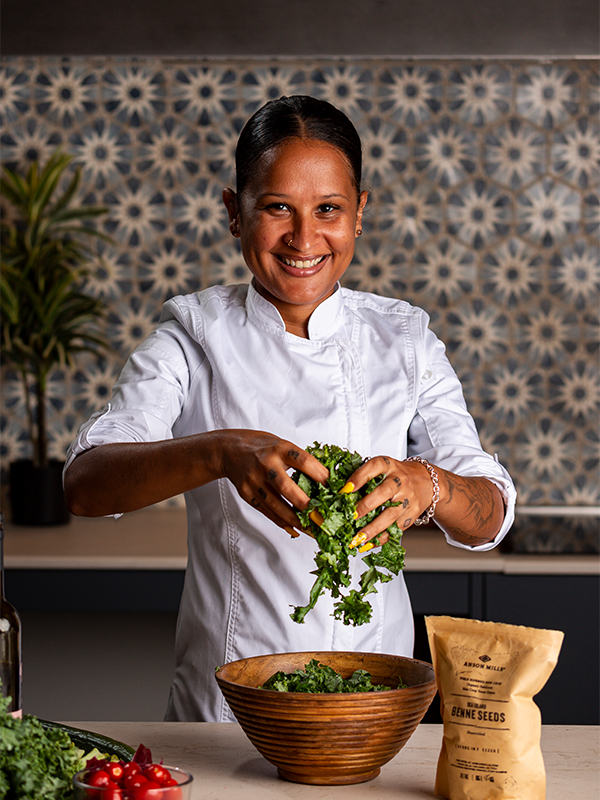This essay contains content related to eating disorders.
It is November, the beginning of hunting season in the Midwest. I have come out here every weekend, sometimes just for the day, sometimes to stay multiple nights in one of those fancy Getaway cabins with the big windows. This time, I’m here to hunt. I’ve chosen a recurve bow and arrow instead of a gun, so everything about this is harder. But the bow feels safer, more natural in my hand. During weekdays, I practice at the range in Chicago, and make my shot almost every time. But range is not woods, and a paper target is not a scurrying animal. There is no life in the range, but here I am surrounded by it. Here, my arrow can kill. Here, my arrow can feed me.
I see a rabbit. I know as I place the string in the nock and draw my hand to my cheek that this is the shot I am going to make. I don’t know how I know, but I do. And I’m scared. After I take this animal’s life, with my own hands, I will be a different person. The rabbit is still, almost as if it’s waiting for me. Take, eat: this is my body, which is broken for you. My gratitude comes before the kill. I inhale. I exhale. And I release the arrow.
My maternal grandmother was a sharecropper—part of a system of indentured servitude for Black people in the South, with only marginally more freedom or wages than chattel slavery. Landowners monitored our behaviors, evicting us for whatever they deemed to be “misconduct.” Large groups of Black people were only permitted on the land for Sunday service, and every part of our existence had to be rented from white landowners, putting us in perpetual debt.
When we’d drive down to Alabama to visit decades later, my grandmother told me about her life before she’d migrated North along with six million other Black people, to escape poverty, racial terror. Three of my great-uncles had been lynched—one is interred in the lynching memorial in Montgomery—so her fears weren’t unfounded.
She’d tell me of picking cotton, the sharp bolls cutting into hardened finger flesh, the sun that burned skin through fabric, the care they took not to step on venomous snakes in the tall grass they moved through as one. Sometimes I dream that I am in a cotton field, wearing a white dress, being bitten by snakes. “Never step in tall grass,” my great-grandmother told me when we kids would play outside. “There’s all kinds of snakes in there.” My grandmother, after her sharecropping days, didn’t so much as plant a flower garden.
My family were also subsistence hunters. Wages from sharecropping were not enough to feed a large family. And, later, when machines replaced workers and sharecroppers were evicted and stripped of the land they worked hard to build, the band aid food programs pushed out by the government did little to help. So they laid traps, hunted, foraged, fished—anything to supplement a diet where even oranges were a luxury only given at Christmas.
But as I grew older, during my visits to Alabama, I ate less fried rabbit, less deer stew, less dandelion greens, and less tomatoes from the yard. We ate more from the Piggly Wiggly, more from the fried chicken shack, and more from the gas station. My little cousins once asked me what a strawberry was; there was so little produce in the local grocery store. The lifestyle we’d once had was only recognizable in the small corral of horses my cousin owned, where we’d go down to pet and ride them.
I haven’t been to Alabama in more than a decade. When I was 19, I became estranged from my abusive mother. It took so little time for the estrangement to become complete, to include not just her but most of her family. It took so little time for me to lose half of my bloodline. After the estrangement, I knew I had to give myself another name. I had to change who I prayed to, how I walked and talked and what I believed—and how I ate.
The person I was meant to be was calling me, telling me to come and find her.
When I thought of creating a new person, I thought of things holy, and I thought of food. Concepts that had been inextricable since I was young and my grandmother—who’d gone from sharecropping to a doctorate in Divinity—made me take communion. The body of Christ, in a wafer. The blood of Christ, in a small plastic cup of grape juice. I practice Islam now, but her words still echo. Take, eat: this is my body, which is broken for you. A body breaking so that I might live, a body being deconstructed for my use, a living thing transferring its energy to me—this is the essence of spirit and food.
The person I was meant to be was calling me, telling me to come and find her. She was in the woods and the water. She was in the tautness of a bowstring, and the weave of a fishing net. And it was time to discover her.
Foraging
I thought foraging was the simplest part of my journey. And in terms of access, it was. You don’t need a license to forage and you can do it anywhere (archery lessons, safety courses, and fishing and hunting licenses came later). But foraging is no less vital, no less of a spiritual experience. Linda Black Elk, an ethnobotanist and member of the board of Native American Traditional Food Systems (NATIFS), took me foraging in the simplest of places—Chef Sean Sherman’s backyard. “All around you, there is food,” she told me. “If the apocalypse comes, you won’t starve. The idea of apocalypse felt likely these days. The climate crisis was destroying our human world. Cities drowned, cities burned, people lost their traditional ways of hunting due to fires and overfishing and colonialism.
We found acorns—I ate one off the ground that had fermented in its shell, tasting beer. We gathered horseweed, a peppery green reminiscent of horseradish or arugula. We discovered mushrooms I would have passed by, assuming they were rocks, and she taught me how oak bark can be made into teas to treat diarrhea or poison ivy.
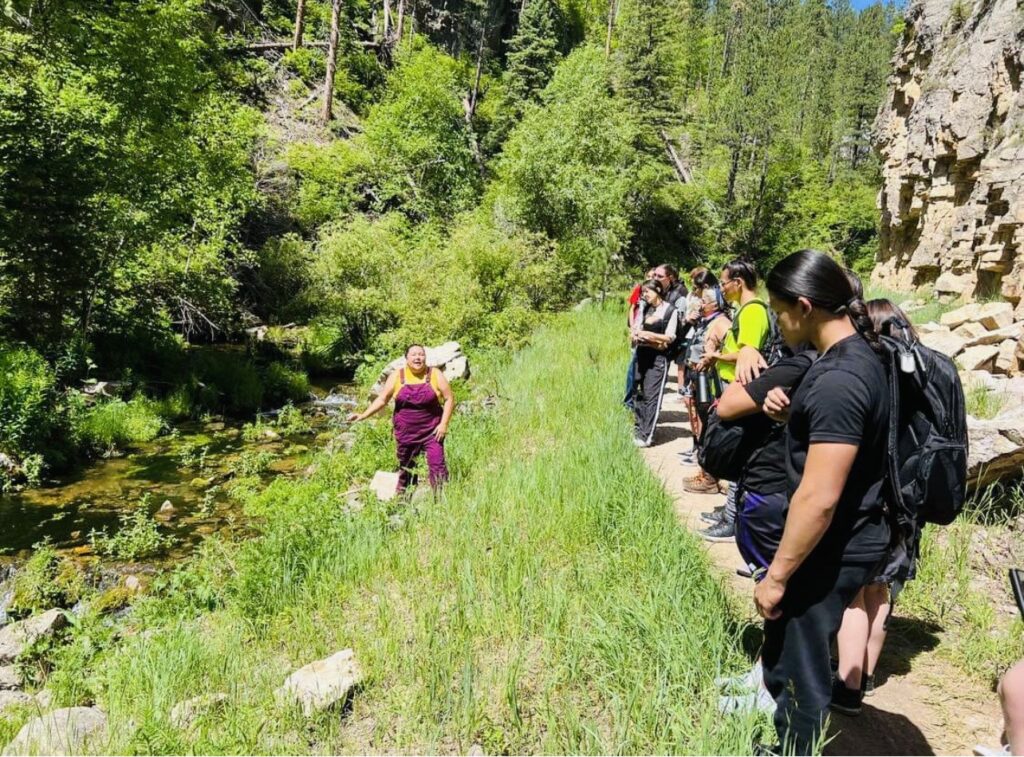
“I guarantee your grandmother or great-grandmother knew about these and used these,” Linda said, drawing my attention to stinging nettles, with their minuscule but sharp hairs on the leaves. “The stinging hairs have compounds that are anti-inflammatory. You’ll see a lot of elders on the reservation who will whip their joints with it to treat arthritis or carpal tunnel. You can make tea or tincture for allergies, or anything to do with inflammation.” She added that inflammation can cause depression and anxiety—two things I had plenty of.
Inside, Sean’s partner, Mecca Bos, had cooked a homemade meal mixing West African and North American Indigenous ingredients. In the smoked turkey egusi, Mecca used many of the things we’d foraged that day. At dinner with Linda and her husband Luke Black Elk, Sean talked about his home reservation, Pine Ridge, in South Dakota, the land of the Oglala Lakota, he and Luke’s tribe. “We were both cowboys and Indians,” he reminiscenced, talking of riding horses on endless land.
Sean talks about Pine Ridge the way I talk about Alabama. But Sean goes back to Pine Ridge, and I don’t go back to Alabama, except in my dreams. I don’t go back because there is nothing left for me there, and also because sometimes, when I dream of Alabama, I think of the bad things—the abuse that made my mother and grandmother who they are, the stench of the nearby paper factory, the snakes in the tall grass. Alabama feels lost to me, which is probably why it felt so urgent now to reclaim some of it at least, by hunting, by foraging, by fishing the way my ancestors had done.
Fishing
I am part of the African Diaspora, but my personal connection to the continent has always felt shaky. It wasn’t until I crossed the Atlantic Ocean by ship that I realized that this body of water—one of the Earth’s largest mass graveyards—was my origin point.
My father’s family are almost all in America now, but they are Caribbean Creoles from Anglo and Dutch colonies who immigrated to the mid-Atlantic, in Washington D.C., to study at Howard University. Our culture is still firmly African, but mixed heavily with European and South Asian influences. The way my family looked confused people, in turn making me confused. “What are you?” I remember asking my dad once. “I’m a mutt,” he said simply.
The word “creole” comes from the Spanish verb criar, which means “to breed” or “to raise.” A confession: I hear the word Creole and I feel a deep sadness and anger, thinking of the African ancestor that started our family, who was chosen for breeding by this Dutch slaver whose name many in my family still bear. Was she a young girl? Did she come from a fishing village? What would she think of her family now, some of them unrecognizable from the African origins of her people?
I don’t know anything about her except that I am her, and from her my family sprung out of the ocean. My father’s family has constantly had to recreate itself, to adapt to their environment. I must also create myself, and start by giving homage to the gods and ancestors in the ocean that made me.
I was not afraid of the ocean. I knew its power. It wasn’t the ocean that scared me, it was what the beings deep within the ocean felt.
I chose to fish a bit further from home, in South Carolina. My friend and Gullah Geechee Chef Amethyst Ganaway lured me to visit by talking of all the crab we’d eat—the surest way to get a D.C. girl to do anything is to promise her crab. “Come home, Charlene!” Amethyst texted me, jokingly riffing off an Anthony Hamilton song.
In Charleston, we woke at dawn and met Tia Clark, Amethyst’s friend and the owner and operator of Casual Crabbing with Tia, down by the dock. Tia was bursting with energy, her long locs in a ponytail and a blue crab tattooed on her thigh—to ensure that even if she forgets a ruler, she can always check to see if her catch meets the legal size requirements. Tia was a glimpse of the person I wanted to be. Tia came alive out here on the water, and I’d never seen someone doing a job that made them so incandescently happy. With pride, she recounted how she’d hunted an alligator with a bow and arrow in the swamp.
My Southern accent got deeper and deeper around her and Amethyst, and the day felt like one spent with family. We put raw chicken in baskets and threw them off the dock, put chicken on strings and dropped them to the bottom of the water, and gathered our traditional nets as well. We tried crabbing with all three methods—the baskets were the most successful and the nets were the most fun. The string, though, required a level of patience I was unaccustomed to. “This is the way the old people did it,” Tia laughed, teasing me for my lack of self-restraint, because I pulled it too fast, alerting the crabs to my presence and making them drop off the line.
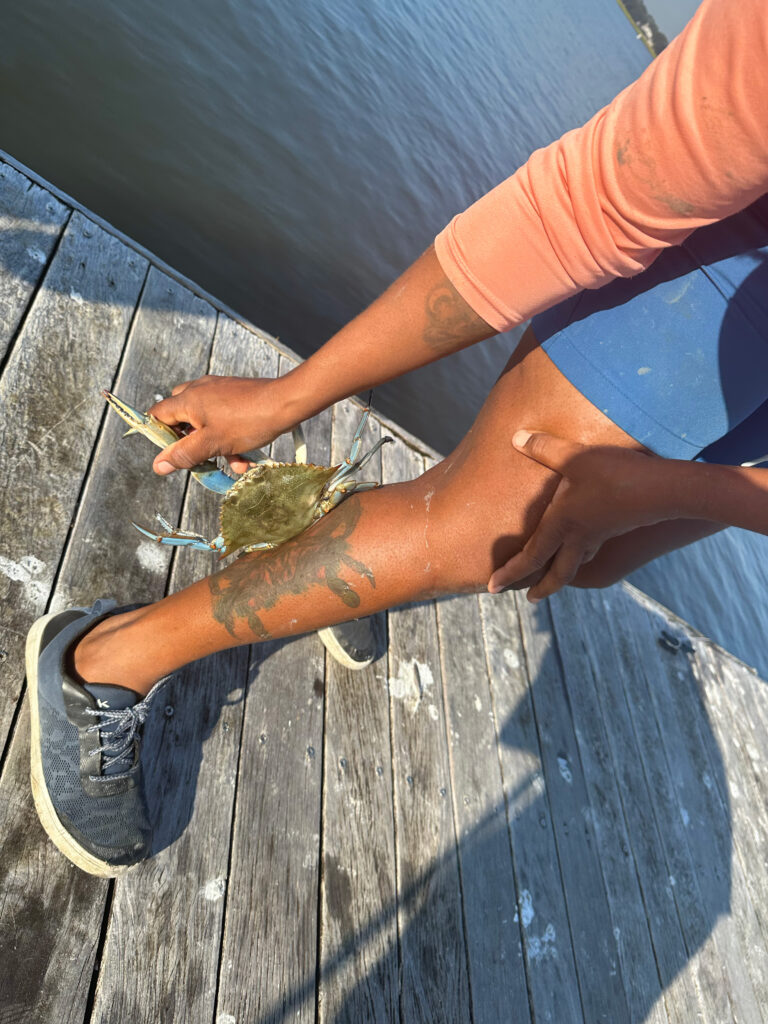
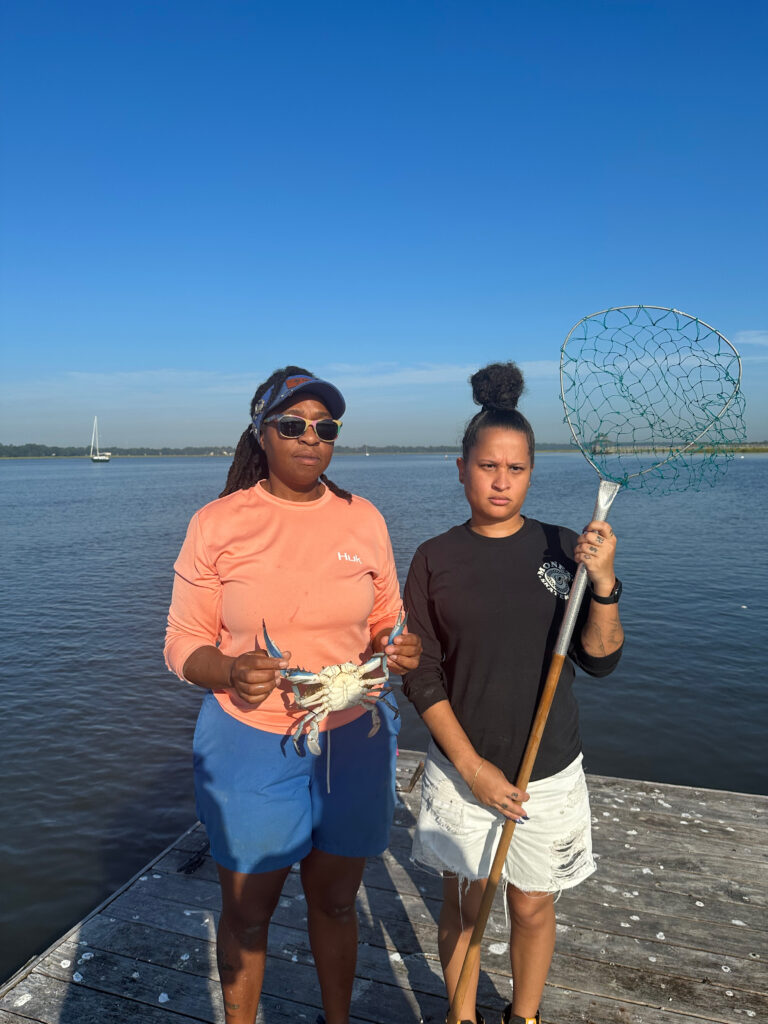
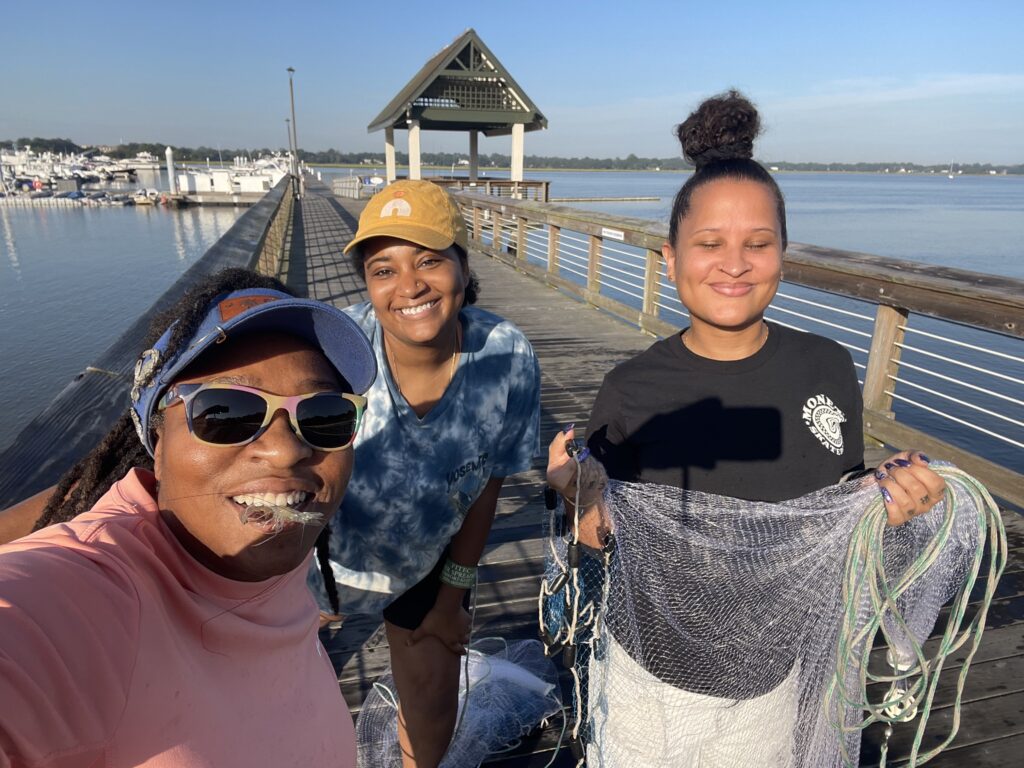
With the fishing rods, both Amethyst and I each caught a stingray. I was hesitant to touch this alien-looking thing I’d only seen at aquariums, but Tia insisted, turning serious. “If you are going to catch this animal, eat this animal, respect it by touching it. By feeling it.” So I did, stroking the stingray’s smooth back while its eyes stared at me. I wondered what it was thinking. “We ain’t eating these though, right?” I said, but Amethyst protested.
“You wanna cook these?” Tia asked, incredulously.
“Hell yeah,” Amethyst replied.
At the end of the fishing trip, we walked away with a YETI cooler full of crabs and two stingrays, and went to Charleston Crab House, where they cooked them for us with plenty of butter and Old Bay. After eating, we walked around Charleston—a city I had a complicated relationship with. It was beautiful; the Black women selling sweetgrass baskets in the market, their patterns unique to their family. We ate again, inadvisably, at Hannibal’s Kitchen, an authentic Gullah restaurant that served us crab rice and okra soup. There was so much to love.
But slavery was everywhere. I got called a nigger by a passing driver while walking though the luxury shopping district. And that was the least traumatic thing about this city. The cobblestone streets were made of ballasts that were used to weigh down slave ships. Slave quarters were turned into apartments. The same families that owned us and whipped us were living in the houses we built, closing the intricate iron gates we wrought to keep us out, pushing expensive strollers around their neighborhoods—looking happy. Looking rich.
I felt dangerous fury and disgust. When we went to the International African American Museum, we walked on the historical beginning of Gadson Wharf and my feet touched the same place where our ancestors stepped off from Africa—from Senegal and Ghana and Cameroon and Nigeria—and entered this world for the first time. I knew my ancestors had likely come through here, since this was the busiest slave port in North America, receiving 40 percent of enslaved Africans. In the museum, we saw how their African names—Harsanna, Musa, Warsan—were changed into European ones—Peggy, Isaac, Matilda.
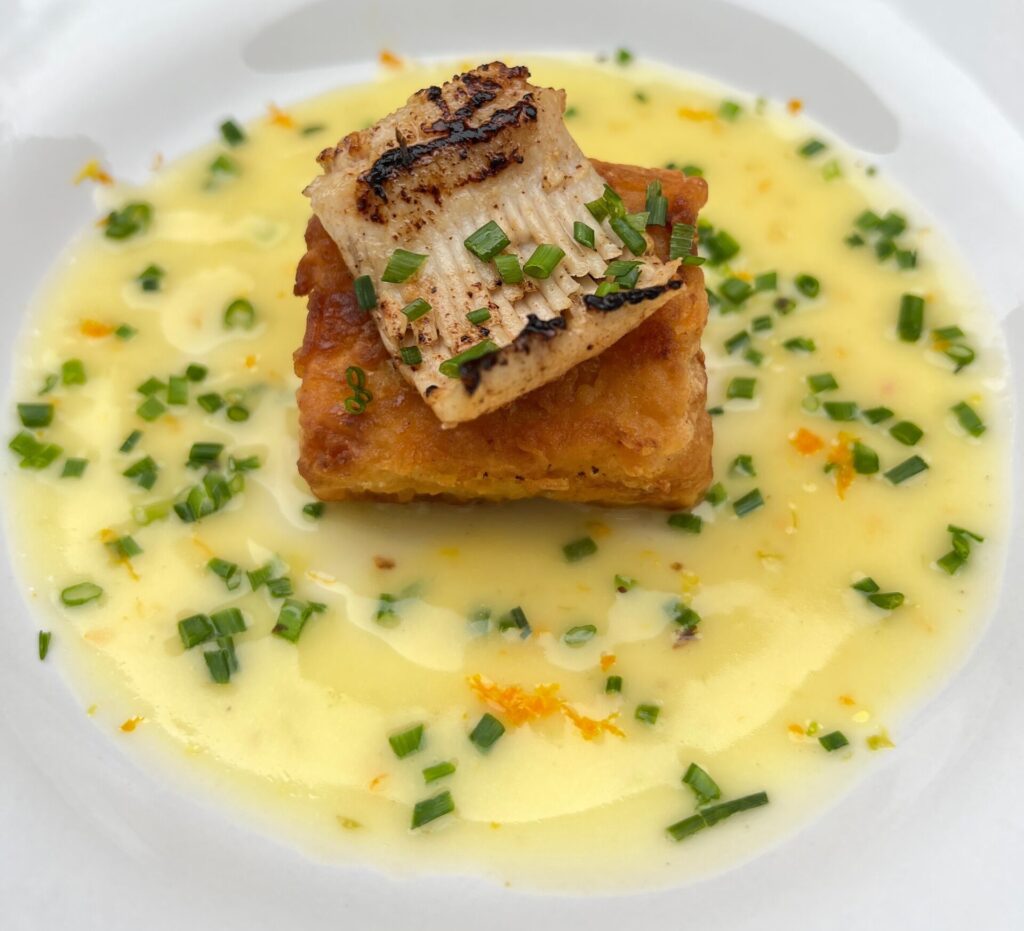
Later that night, Amethyst grilled up the stingray—in restaurants, you may know it as skate wing—with an Anson mills polenta cake and a citrus butter sauce. “I am not bullshitting when I say the water was calling me to come back home,” Amethyst said as we ate, telling me the story of how she’d moved from New Mexico back to Charleston. “I feel the water on my skin, in my hair, in my blood. It is such a peaceful but powerful force and people be so afraid of it.” She thought for a minute and said, “Well, we should be afraid, but they scared for the wrong reasons.”
I was not afraid of the ocean. I knew its power. It wasn’t the ocean that scared me, it was what the beings deep within the ocean felt. I could feel them now, could feel their fury, coursing through me, pulsing through me, replacing my blood with saltwater.
Hunting
When I came back to Chicago from the Carolinas, I had fevers and nightmares and headaches—an unexplained illness I assumed was COVID-19, but knew was more than that. Charleston had been too much. I had let the dead in, too far. One day, my eating disorder returned with a ferocity I hadn’t seen since I was in my teens. It soon surpassed that. I starved myself and purged—a fatal mixture of anorexia and bulimia that left me trying to keep myself somewhat alive with the electrolytes from Gatorade Zero.
Then October 7 happened and Hamas—the Palestinian resistance group—killed some 1,400 Israelis.
Then, shortly after, Israel bombed the Gaza Strip into near oblivion, causing the deaths of over 10,000 people in under two months, most of them children. A genocide played out on social media. I saw a fetus whose death certificate was issued before their birth certificate. A father carrying pieces of his children in plastic bags. And always, burning flesh. I said a prayer for the dead all day and all night. Inna lillahi wa inna ilayhi raji’un. Indeed, we belong to Allah, and indeed, to Him we return.
Just days after my fishing excursion, an Israeli strike burned the boats and the fishnets of Palestinian fisherman. A fisherman, Tarek al-Quraan, wept, “There’s nothing left. We have nothing left to cry over, absolutely nothing. How are we supposed to feed our children from now on?”
I became less and less attached to this world, to this life so filled with violence and colonialism and me, so powerless against it. I felt empty in all senses.
So, I almost didn’t go to Pine Ridge Reservation—Sean’s home he’d told me about—to hunt with Chef Kimberly Tilsen-Brave Heart, owner of Modern Indigenous, and hunter Chance Renville. The day I was due to leave, I grabbed my phone to call and cancel. But something stopped me. I went and I took a train and a bus, ending up in Rapid City, South Dakota after a 23 hour journey.
In Rapid City, decked out in my hunting gear from Duck Camp, I met Kimberly for the first time and she drove me through the Badlands to Pine Ridge Reservation, the area where the United States forced the Lakota on, knowing that survival in these near-barren stretches of land would be nearly impossible, especially after the government killed all the bison, a sacred animal in Lakota culture that has since been brought back.
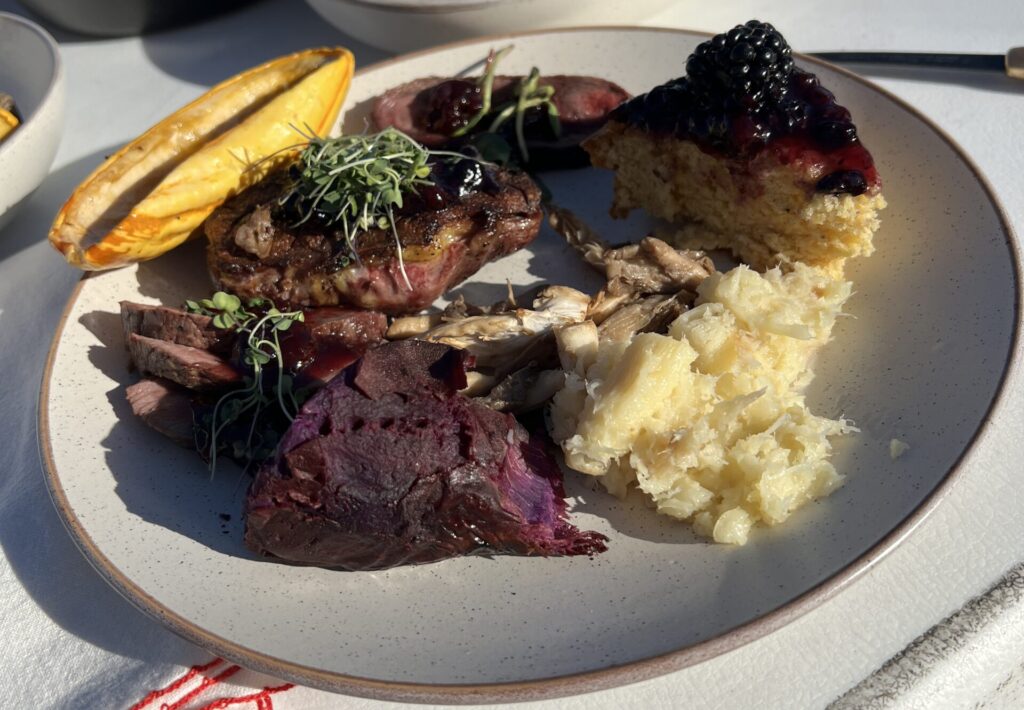
First, we cooked. I had anxiety about it all day—wondering how I’d mentally be able to eat all that food without purging. The game—duck, antelope, and elk—had all been hunted by Chance previously. Kimberly had foraged lion’s mane mushrooms and sauteed them in butter over the same open flame we cooked the meat on. She made a mixture of timpsila, a Lakota prairie turnip with parsnips and she cooked purple sweet potatoes right there in the earth. There was wojape, a Lakota berry sauce that we topped the duck and antelope with. We also had cleansing mint tea, along with tender trout. Chance made a spirit plate and prayed in Lakota before we ate. And I did, to my surprise, eat. All of it and then seconds. It was the first meal I’d had in almost a month that had given me peace.
It was time to hunt, and we passed the barbed wire fence separating the hunting area. We hid in the tall grass, which went against my instincts, my fear of the snakes who lie in wait. But this was the land of the Oglala Lakota, the grasslands. What applied in Alabama did not necessarily apply here. I had to trust Chase and Kimberly, that they knew their own lands as much as my family knew theirs, that we were safe.
After what seemed like hours of waiting, our first hunt felt like it happened in a split second: All at once, I heard duck wings flap above, I smelled the acrid gunpowder as my body shook from the sharp sound of a gunshot. It all happened so quickly that it took me a moment to realize Chance had caught one—a female duck.
When Chance brought her to me, I asked if I could hold her. Tia’s voice was in my head: If you are going to catch this animal, eat this animal, respect it by touching it. By feeling it. Chance passed the duck to me. When I held her warm body, I gasped, unable to tell if this was life or death in my hands. She was so warm, her oiled brown and iridescent emerald feathers like the hair of a child as I stroked them. I could not tell the difference between her life and mine. “Thank you,” I whispered to her. “You’re beautiful.” I began to cry silently. Kimberly tried to comfort me. “She is going to feed Chance’s family,” she said “They just had a baby. She’s not going to waste.”
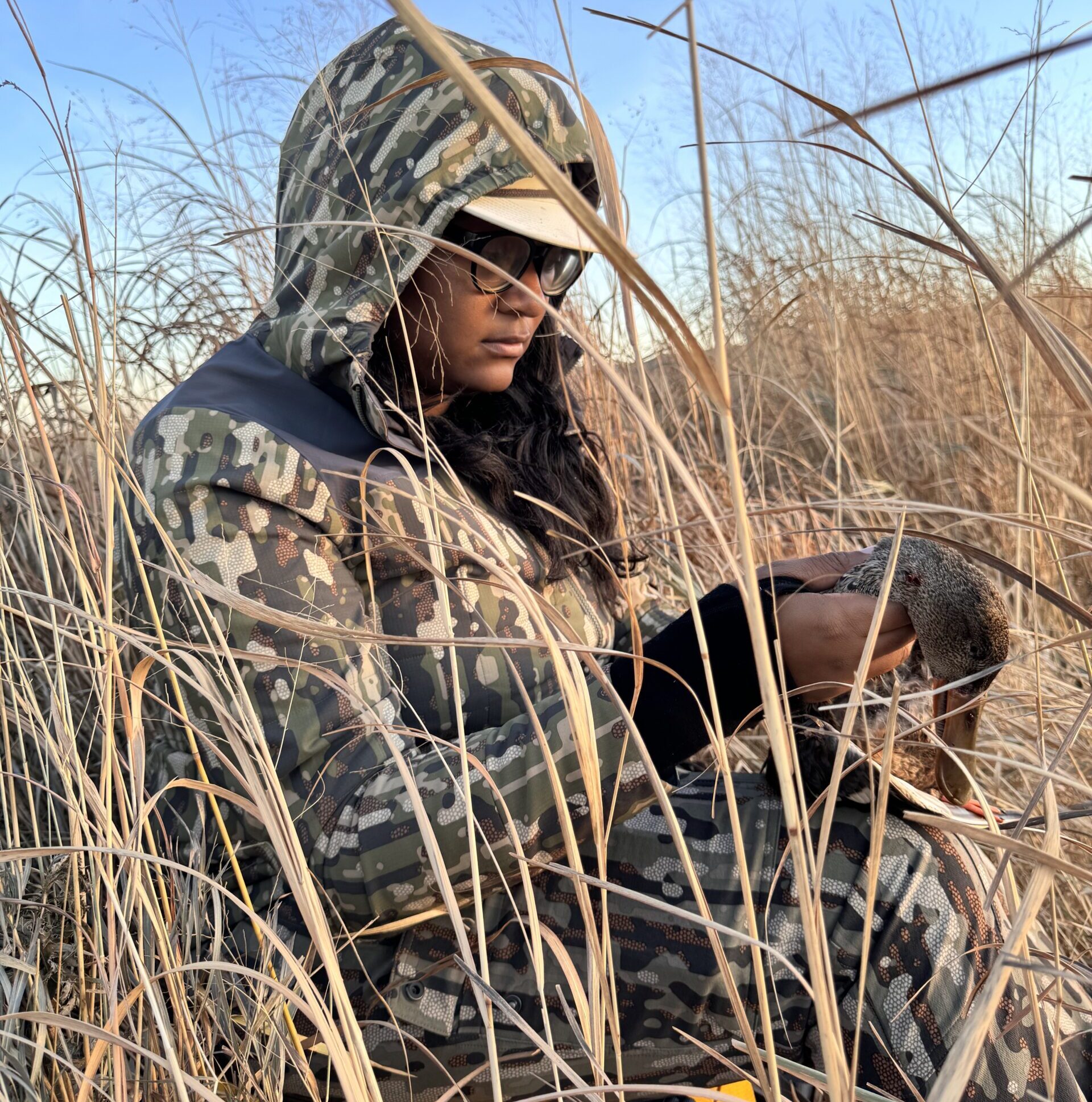
I felt shame, wondering if my tears meant I wasn’t cut out to be a hunter. “Is it okay that I’m crying?” I asked Kimberly. “Yes,” she replied. “It means you are human.” I held her for a long time, just stroking her feathers, while Chance continued hunting. And then, I felt something in my fingers change. At first I thought it was rigor mortis but this felt different. Spiritual. Her energy was flowing out of her and into my fingers, and from my fingers somewhere unknown. Surprised, I told Kimberly, “Her body is changing.” Kimberly nodded. “Yes. That’s her soul leaving.” I sat in wonder and in gratitude. I had felt a soul.
After a few more ducks were caught, Chance looked around in the grass for a while, trying to find two he had shot. He seemed concerned. When you lose meat that comes from supermarkets, you don’t see it as a loss of life. It is a loss of dollars and cents by the pound. But out here, in the fresh grass, we felt scared to lose these ducks because it would mean they died for nothing, that we killed just to kill. And after feeling a soul leave their body, pass through my hands, and into the spirit world, leaving the ducks behind was unimaginable to me too.
As Kimberly and Chance looked around, I put my hands in the grass and found a white feather that looked distressed; it hadn’t fallen out naturally. I looked up at the sky and remembered which way the ducks were flying, went in that direction, found another feather, and kept going until I saw the duck in the grass, and then the other one.
Chance and Kimberly were surprised, and proud. “You might be a tracker,” Chance said. It felt marvelous to me, this idea that I could have a skill besides writing or cooking. Tracking for me felt like empathy. Where would I go if I had been injured? How would I fall? How would I try to save myself? It required me putting myself in the position of the animal we had just killed. Hunting is about understanding the cost of life, respecting it, and not abusing it.
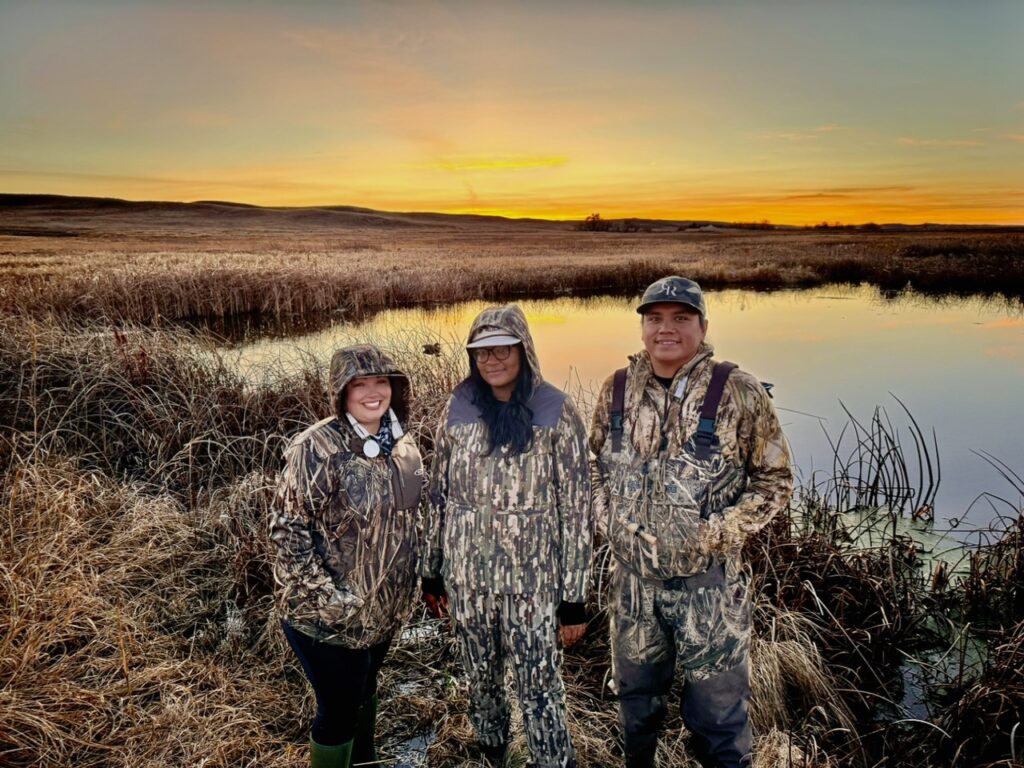
When we wrapped up hunting, Kimberly asked me how I felt and I told her I felt clean, then I corrected myself. “I feel holy,” I said. When I was younger, my grandmother told me that “holy” meant something set aside or apart, or something “cut out.” Holy then, meant that God had excised you. That he had plucked you from a world of sin and set you aside for his use. For me, it meant that I had cut through this veil between worlds: the world of colonialism and exploitation—and the world of peace and sovereignty I wanted to fight for. I thought of the words in the Quran I had been repeating these past few months. Indeed, I have turned my face toward He who created the heavens and the earth, inclining towards truth.
When Kimberly dropped me off, she asked if she could sage me. “I just feel like it was an intense day, and I want to help spiritually cleanse you if that’s okay.” I welcomed the chance to feel even more purified, and stood still in the parking lot of Hotel Alex Johnson as Kimberly passed burning sage over my hair and my body. We hugged and I went upstairs and got on my knees, still smelling of smoke, faced the Qibla in Mecca, and prayed once more. And when I arose, I found the person I was meant to be. I knew her name.
Who decided that I was lost? And why did I believe them? This food is not just the food of my ancestors. It is mine and always has been.
Everywhere, the tools of colonialism are the same. On the land of Oglala Lakota, they killed the bison and forced them into the Badlands, where food was hard to grow. For my people, we were stolen from our original land and forbidden from owning or sustaining ourselves on the land the Europeans had stolen from the Indigenous people here. And in Palestine, the olive trees and fishnets burn.
But right now, in this moment, where I am, I am blessed.
The ancestors who walk with me are hunters, fishers, foragers, and farmers. My family may have lost our traditional ways of eating and I may have had to leave my family behind. But it is not something I have to mourn. Who decided that I was lost? And why did I believe them? This food is not just the food of my ancestors. It is mine and always has been. All I need is a hunting license, a bow, a fishing rod, a gathering basket, patience, and life.



